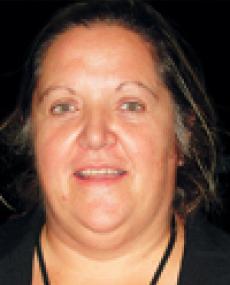Marion Monica Sparg was born in East London and was one of six children. She grew-up in a white middle-class English-speaking South African family in the Eastern Cape, with German and Irish origins. After completing her studies, Marion worked as a journalist for the Sunday Times. While working as a journalist, Sparg alongside Arnold Geyer and Damian de Lange was so outraged by the failure of the Progressive Federal Party (PFP) to boycott the Republic Day celebrations that she fire bombed the party’s offices on 31 May 1981.
After this incident, Sparg left South Africa in 1981 and went into exile in Botswana where she made contact with the African National Congress (ANC). She then left for Lusaka in Zambia from where she was sent to Angola. It was here that she received military training at the ANC’s Caxito camp. Sparg was the only white South African and sometimes the only woman in the camp. The killing of 32 ANC members and 19 civilians in the Lesotho Raid by the South African Defence (SADF) only strengthened Sparg’s resolve to fight against the apartheid government. In August 1982 Sparg returned to Zambia where she worked on the ‘Voice of Women’ a publication of the ANC that was compiled and circulated by the Department of Communications of the ANC and thereafter joined the Special Operations Division of the uMKhonto weSizwe (MK).
Working together with Stephen Marais, Sparg smuggled limpet mines and detonators from Lesotho into South Africa. Once in the country she established links with the ANC in Lesotho and carried out reconnaissance on potential targets. Subsequently, she placed these in three South African police stations, Cambridge police station in East London, the notoriously infamous John Vorster Square and Hillbrow police station. The two limpet mines in Cambridge and John Vorster Square exploded causing damage with the latter suffering an estimated R38 000 worth of damage. The bomb at Hillbrow did not explode as timed, but exploded as it was being diffused by the police.
As a consequence, her flat in Hilbrow was raided by the security police on 7 March 1986 resulting in her arrest. She was detained under Section 29 of the Internal Security Act (Act 74 of 1982) until her court appearance at the Rand Supreme Court on 15 August 1986. Sparg admitted to implanting and exploding limpet mines in the three police stations. On 6 November 1986 she was sentenced to 25 years in prison, five years for the 1981 arson attacks and 20 years for treason. She was sent to Pretoria Prison where she served her sentence. Sparg became the first white woman convicted as an operative of MK.
As the negotiations between the South African government and the ANC for a transition to a democratic order gathered pace, political organisations were unbanned and political prisoners were released. Sparg was released from prison in 1991. She was nominated as a member of the Convention for a Democratic South Africa (CODESA), multiparty negotiations that led to the first democratic elections in 1994. Furthermore, she was appointed as deputy executive director of the Constitutional Assembly, an assembly that worked on South Africa’s first national democratic constitution.
After the first democratic elections Sparg served in various capacities under the new government, she was appointed as the Town Clerk of the Eastern Metropolitan sub-structure of the Vaal-Lekoe–Metropolitan in 1996. In 1999, she became the Secretary of the National Council of Provinces (NCOP). In 2000 she was appointed as the Chief Executive Officer of the National Prosecuting Authority (NPA), a position that she served in until her resignation in June, 2007. Her resignation followed an exhausting case that started in 2003, when a public spat occurred between the country’s Vice President Jacob Zuma and the NPA. She and her deputy CEO Beryl Simelane and head of the Integrity Unit of the NPA, Dipuo Mvelese, who was also the Deputy Chairperson of the South African Communist Party (SACP,) were accused of tender rigging, corruption and nepotism, in anonymous letters that were sent to the Public Service Commission (PSC).
The Commission could not find evidence linking them to these accusations and therefore referred the matter to the Department of Justice and Constitutional Development. Thirty charges were instituted against these three women. These charges were withdrawn at a formal disciplinary hearing, only to be reinstated two days later, a move that the Financial Mail, criticised and described as ‘bizarre’. The charges were officially dropped in 2007. Since her resignation from the NPA in 2007, she has been working as Specialist in Social Marketing at Draft FCB, a division of DraftFCB SA (2007).
Sparg is currently the Director of DraftFCB and stays with her adopted children, Michelle and Joy.
